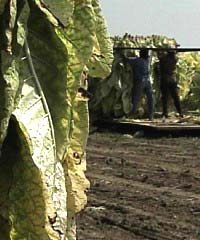Several Factors Affect Burley Tobacco Outlook for New Year
Several Factors Affect Burley Tobacco Outlook for New Year

World burley production levels, demand for tobacco products, and purchase intentions of tobacco companies are just a few of the factors that will impact tobacco farmer profits in 2002.
"We've seen about a 17 percent reduction in world burley production, while at the same time cigarette production around the world has been fairly stable," said Will Snell, Extension agricultural economist for the University of Kentucky College of Agriculture. "Given this tightening supply and demand balance, we could perhaps see some rebounding in terms of world burley production."
Snell said the question is whether or not U.S. growers will be a part of any potential expansion in world burley production.
"Obviously our market is very dependent on what happens domestically," he said. "But at the same time we must also look at what's happening to the trade balance for burley – this past year burley imports have soared up while at the same time our export of burley has gone down, so total demand for our product has declined."
Total demand for U.S. burley is projected to be about 350 to 375 million pounds. Because the burley tobacco quota is formulated using purchase intentions by companies, Snell said purchase intentions for 2002 will obviously have a significant effect on Kentucky growers.
"There is certainly downward pressure on the quota right now due to declining exports and abundant pool stocks. If the companies want us to stay with a stabilizing quota somewhere in the 350 to 375 million pound level, purchase intentions will have to increase," he said.
Record high market prices and continued government and Phase II checks helped offset declining revenues for farmers in 2001. However, cash receipts for Kentucky tobacco will likely fall to near the $500 million level for 2002. This compares to a record level of $924 million in 1998.
Other critical issues affecting the 2002 outlook are potential trade with China, disposal of the 1999 U.S. burley loan stocks, implications of reduced nitrosamines and genetically modified tobacco production, the structure of the U.S. burley program and marketing system, and the much- discussed quota buyout issue.
